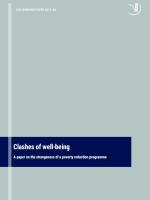A poverty reduction programme changing lives to lesser well-being
Marianne Mosebo's working paper "Clashes of well-being"makes an ethnographic contribution to the discussion of what constitutes well-beingand valued life for people. It does so by exploring a poverty reduction programme in Moroto Town, Uganda, and how the programme came to be perceived as strange and even damaging to the people who benefitted from it. The programme sought to live up to standards of participation, conflict sensitivity and sustainability, but in practice it failed to provide changes in people’s lives that they had any reason to value.
The paper follows a line of thought, which regards values as those actions one is most willing to invest energy in because they are praised in the social world one is or wishes to be part of. It illuminates how the actions that the programme generated were actions that the beneficiaries contributed little value or no value, while it impeded the actions that were highly valued.
The programme ended up literally endangering the beneficiaries’s lives as well as it challenged their social worth in the social lifeworld they valued being part of.
The working paper is based on a chapter in the author's PhD thesis: "Enhancing well-being: Urban Karimojong youth between security and development in Uganda".
